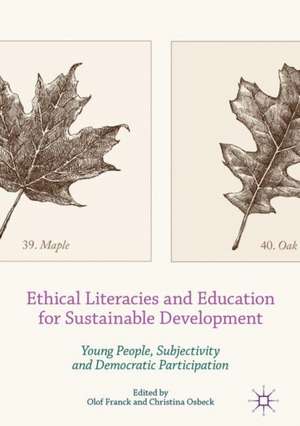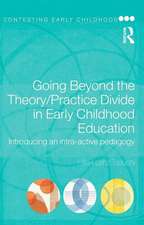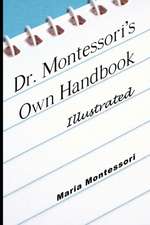Ethical Literacies and Education for Sustainable Development: Young People, Subjectivity and Democratic Participation
Editat de Olof Franck, Christina Osbecken Limba Engleză Hardback – 12 mai 2017
| Toate formatele și edițiile | Preț | Express |
|---|---|---|
| Paperback (1) | 577.72 lei 6-8 săpt. | |
| Springer International Publishing – 7 aug 2018 | 577.72 lei 6-8 săpt. | |
| Hardback (1) | 725.75 lei 6-8 săpt. | |
| Springer International Publishing – 12 mai 2017 | 725.75 lei 6-8 săpt. |
Preț: 725.75 lei
Preț vechi: 885.06 lei
-18% Nou
Puncte Express: 1089
Preț estimativ în valută:
138.88€ • 148.50$ • 115.79£
138.88€ • 148.50$ • 115.79£
Carte tipărită la comandă
Livrare economică 17 aprilie-01 mai
Preluare comenzi: 021 569.72.76
Specificații
ISBN-13: 9783319490090
ISBN-10: 3319490095
Pagini: 181
Ilustrații: XXIV, 175 p. 6 illus.
Dimensiuni: 148 x 210 x 13 mm
Greutate: 0.39 kg
Ediția:1st ed. 2017
Editura: Springer International Publishing
Colecția Palgrave Macmillan
Locul publicării:Cham, Switzerland
ISBN-10: 3319490095
Pagini: 181
Ilustrații: XXIV, 175 p. 6 illus.
Dimensiuni: 148 x 210 x 13 mm
Greutate: 0.39 kg
Ediția:1st ed. 2017
Editura: Springer International Publishing
Colecția Palgrave Macmillan
Locul publicării:Cham, Switzerland
Cuprins
Chapter 1. Highlighting Ethics, Subjectivity and Democratic Participation in Sustainability Education: Challenges and Contributions; Olof Franck.- Chapter 2. Philosophizing with Transdisciplinarity, Relational Knowledge and Ethics in Education for Sustainable Development; Marie Grice.- Chapter 3. Pupils Views on Moral Competence in School; Annika Lilja.- Chapter 4. Fiction at School for Educational Purposes: What Possibilities do Students Get to Act as Moral Subjects?; Anna Lyngfelt.- Chapter 5. Discourses of Available and Sustainable Lives: Ethical Literacy Offered to Tweens Through Fiction Reading; Christina Osbeck.- Chapter 6. Windows on a Changing World: Using Children’s Literature as an Aesth/Ethical Trope in Early Years Education for Sustainability; Dawn Sanders.- Chapter 7. Challenging Discourses in Early Childhood Education for Sustainability: A Posthuman Perspective; Kassahun Weldemariam.- Chapter 8. Life-World Perspectives on Art-based Environmental Education and Sustainability; Margaretha Häggström.- Chapter 9. Aesthetic Experiences Relating to Living Plants: A Starting Point towards Framing Humans’ Relationship with Nature; Eva Nyberg.- Chapter 10. Concluding Remarks; Olof Franck & Christina Osbeck.
Notă biografică
Olof Franck is Associate Professor of Philosophy of Religion and Senior Lecturer in Subject Matter Education in Social Studies at the Department of Pedagogical, Curricular and Professional Studies, University of Gothenburg, Sweden.
Christina Osbeck is Associate Professor of Religious Studies and Senior Lecturer in Subject Matter Education in Social Studies at the Department of Pedagogical, Curricular and Professional Studies, University of Gothenburg, Sweden.
Caracteristici
Includes an afterword by Arjen Wals which is free to download Examines education for sustainable development in schools through the lens of ethical literacy Argues that education for sustainable development is more successful if students learn to become engaged moral agents rather than through testing and assessment Explores how children acts as moral subjects through the medium of fiction, reading and art









